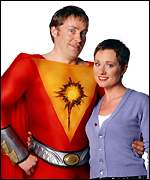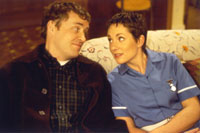This interview first posted: 20 July 2002. This interview took place 12 March 2002
John Freeman chats with Paul Mendelson, the creator of My Hero, about the state of British TV comedy, writing and flying babies…
downthetubes: You’ve said in the past you don’t know where the idea for My Hero came from but once you got it, how long did it take to bring to screen?
Paul Mendelson: Well in a way, I can see how it came about. There’s this strange thing where ideas just pop straight in to your head and suggest some sort of process. But I know I always like writing romantic comedy and I know that a close friend of mine is a very high-powered lawyer. And when a client snaps his fingers he’s got to be there, just like a superhero. He travels all round the world. His partner is obliged to leave whatever’s happening. That’s an interesting premise really. How do you make that funny? That’s what started me off.
My Hero is what we call a High Concept, a Big Idea show. Cheers isn’t a Big Idea; neither is Friends. That’s not to disparage them, they’re brilliant. It’s all in the characters, it’s not in the actual intrinsic idea, which is called High Concept. There are very few High Concept comedies come along. They come along every so often. Goodnight Sweetheart was a High Concept comedy.
I come from advertising and there really are only two things you can do in advertising — High Concept and redundancy. Basically, you have to have a high concept idea because it sells the product. So I’m trained to think in what they call in advertising The Big Idea. Which is why the first thing I wrote, although it wasn’t the first thing to be put on air, was So Haunt Me which was about a house which was haunted by a Jewish mother. That’s really High Concept.
And then the next high concept show was My Hero, about a woman being married to a super-hero. That must be the way I think, because of my advertising training, as opposed to most comedy writers’ training, which is comic sketch shows.
I think one of the reasons Ardal accepted the role [was because it was High Concept]. He’s told me he was offered dozens of comedies after Father Ted — four a week– and I said, “What made you chose this?” and he said, “I could see it.” It actually had a visual element. Most situation comedies don’t have a visual element but My Hero does.
downthetubes: Did you read any comics growing up?
PM: Oh, Batman I think.
downthetubes: So what sort of input does the BBC have?
PM: Well, My Hero is an independent production for the BBC. Big Bear hire all the people, all the people they hire are freelance. We’re not even using the BBC studios — we’re using Teddington, which were the old Thames Studios. But it is a production for the BBC so Geoffrey Perkins, as was and now Sophie Clark-Jervoise as the new Head of Comedy, they’re the executive producers of the show. BBC pay Big Bear to make the programme. We own the rights but the BBC own the programmes.
downthetubes: So if you wanted to make a book or magazine from the show…
PM: I think it would be probably a joint deal. I think we have to do it jointly with them with videos…
downthetubes: Actually that’s a question that fans have asked me, when is it coming out on video?
PM: Oh well, tell the BBC please because we have been encouraging them to do that! Hopefully it will come out on video and we’ll also think of things like lunch boxes.
(Since this interview was first published episodes of My Hero have been released on DVD in the US and UK. Search for them on amazon.co.uk)
downthetubes: I can see the catchphrases being used…
PM: Exactly — the thing that kids have caught on to is the silly greeting George and Arnie do, and Piers saying “I’m always here”.
downthetubes: Do you find a short commission, six episodes, highly frustrating? Do you think a show like My Hero would benefit from a longer run like a US sitcom?
PM: Well, we’ve just done 10 for this season. So yes I fully agree that it would benefit.
The biggest difference between British and American sitcoms is that somehow they’ve all got to be winners, people in American sitcoms have to be winners whereas we tend to celebrate the loser in some way. So I think we’re maybe more true to life. We’re not just wisecracks and gags.
Not that My Hero is a good example, but I like to think we have a bit of depth. Although, having said that, when the Americans do pathos they do it brilliantly. I don’t think at the moment in many ways we could teach them a great deal.
downthetubes: How about irony?
PM: No, they’re not big on irony. Though if you look at Frasier, that’s got irony, it’s got wit, it’s got sophistication and it’s a mainstream comedy that might just scrape onto BBC2 in this country. Really, you can’t imagine a comedy about two psychiatrists getting on mainstream British television.
I think we have a different sense of wit to them. They have sort of wisecracks, and what they somehow seem to accept is that not everybody will get our jokes but we’re going to do them and some of them will be for the people who might not get them. Sometimes you feel maybe with British comedy, mainstream, that every joke has to be got by every single member of the audience otherwise it’s not worth having. Maybe sometimes you wonder are we dumbing down a little bit?
The stuff that I tend to like tends to be on BBC2 interestingly, or Channel 4. But interestingly, the stuff I like to write is on BBC1. But I like to write the stuff for BBC1 maybe because I don’t see it that often.
downthetubes: What’s the things that you’d like to do on My Hero that you haven’t yet, or are you still pushing the envelope?
PM: I don’t know. I think each time we do it, we’re going wilder. Its silly, but actually the challenge is to contain it in a way because essentially, it’s a sitcom. It’s not Red Dwarf, we can’t go anywhere. We’re set in the present day. The humour comes from having a superhero in a normal setting.
It’s exactly the same as what happened with So Haunt Me. I wanted to write a Jewish series. But there was no point writing a series all about Jews. There are 350,000 Jews in Britain out of 60million people, so who’s going to be interested, most people have never met a Jewish person? But by putting a white Anglo-Saxon protestant family haunted by a Jewish ghost, suddenly you have the two things impinging. And what makes My Hero a BBC1 show, as opposed to a BBC2 show, is the fact that it’s set amongst ordinary people in an ordinary suburb as opposed to space. So for me the challenge is not to go so mad that you become a sci-fi series.
downthetubes: Yes, you want to keep it reigned in, because if you don’t your audience won’t understand it.
PM: I think if we made it sci-fi we’d lose a lot of our audience. I don’t think they’re watching it because it’s a sci-fi show, I think they’re watching it because it’s funny. It’s odd and it’s different. But I’m hoping that Red Dwarf audiences would watch ours but I think an awful lot of our audience wouldn’t watch Red Dwarf. Because we’re talking about nine, ten, eleven million people. Red Dwarf is not a mainstream show.
The nicest thing, from my point of view, about My Hero is that it was the first series in a long time on BBC that people watch as a family. People watch it with the children. And I gather from friends that it’s also become quite a cult in universities, a lot of students watch it, because they like Ardal.
I think a lot of comedy series in the 8.30 slot get watched by a lot of older people, but this is getting a big young audience.
downthetubes: So, for the fourth season, where do you hope to take the show? (Without giving too many stories away).
PM: I think I’d like to sort of ring the changes again, so that when people watch the first episode it’s not quite necessarily what they expect. It doesn’t just leave off where the last series ended because I think these days you have to keep surprising people, you don’t want them to think “Oh I’ve seen this”. I think you’d want to give them something so they’d know this wasn’t from the previous series, like this series we’re just about to do, there’s a baby, there wasn’t a baby apart from the last episode in the last series. So you will know straight away you are watching a new product.
downthetubes: What do you think the future of sit-com is going to be?
PM: Do you know, I don’t know because I think up until My Hero and My Family they were thinking that family comedy was dead and now suddenly I think the 8.30 spot has become quite coveted and revered so that’s changed.
downthetubes: My Family‘s wonderful.
PM: My Family‘s great. That’s collaborative, they sit around a table and they really work on it. It was created by an American, Fred Barron, who wrote for Seinfeld, The Larry Sanders Show, and created Caroline in the City. He’s heavy duty, he’s a wonderful guy. I know people who work on them. Two of the writers on My Family have written one of the episodes of the new season Ian Brown and James Hendrie and it’s wonderful.
downthetubes: So for you, what makes a great sitcom?
PM: I think actually the characters make a great sitcom. More than the situation, it’s the characters that sustain it. And what more do you want than to laugh? Although, interestingly in the ones that I’ve done, prior to My Hero, and also with some stuff that I’m going to try and do on radio as well, I actually like to ring the changes.
downthetubes: Yes, you couldn’t ring in the changes more than you did with May to December…
PM: She had a miscarriage, and that was actually one of the funniest episodes. Her having a miscarriage wasn’t funny but it happened in the midst of them doing a murder mystery evening and suddenly the atmosphere changed, and you suddenly go into another mode. And the audience was there with you and it was wonderful.
That’s what I like doing. My Hero‘s fun and it’s daft and I love doing it but I still like to do things where you can move people.
downthetubes: Paul Mendelson, thank you very much.
This interview first posted: 20 July 2002. This interview took place 12 March 2002
• Since this interview was first published episodes of My Hero have been released on DVD in the US and UK. Search for them on amazon.co.uk (using this link helps support downthtetubes)
• Buy Paul Mendelson’s novels from amazon.co.uk (using this link helps support downthetubes)
PLEASE NOTE: Any links to external web sites in this interview must not be taken as any validation by Mr. Mendelson of those sites and are entirely the selection of John Freeman

